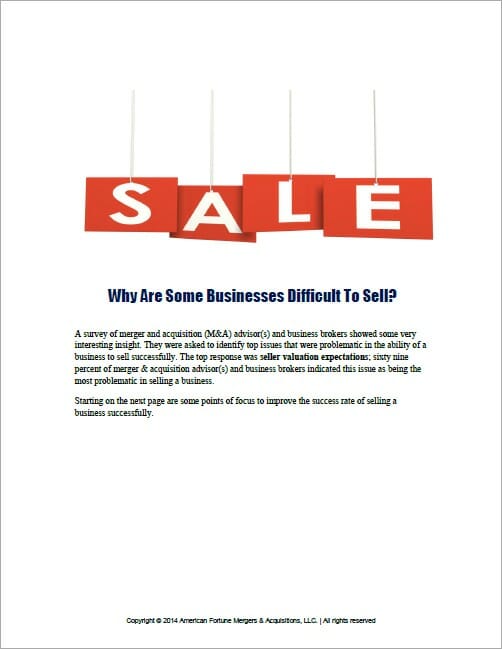 Sample Company Value Reports by an MBA, CVA, CBI
Sample Company Value Reports by an MBA, CVA, CBI
The primary purpose of a company value is to document clearly that the pricing of the business is objective and correct, and to defend that pricing in negotiations for sale or other uses where an accurate value is critical. There is no doubt that most business sale transactions will be heavily negotiated by the buyers and their advisers. Price negotiations revolve around the methods used to value the business. A buyer and or their advisers will of course say it was not correct/accurate company valuation and negotiate for a lower price. A more detailed business valuation allows for a stronger negotiation position by the party with a solid and defensible company valuation.
A comprehensive company value typically consists of a combination of 10 methods to arrive at accurate and defensible business valuation. In performing a company valuation the valuation expert may at their professional discretion discard a valuation method or two that are not appropriate to the valuation of a given business. In the valuation report an explanation of the basis for each method will be given. The comprehensive business valuation will also include more industry evaluation and forecasting of expected industry potential. The valuation report will also have extensive market analysis.
When a business is unique and or complex than is is very prudent to prepare a company valuation that is very comprehensive. An example of when a comprehensive company valuation is highly recommended is when dealing with financial, industry or equity buyers. Another example when comprehensive business valuation would be very beneficial is an entity such as a bio tech firm, especially where there is a new product that hasn’t yet come to market. Also, evaluating the market potential for a new wonder drug is more complex than evaluating historical numbers in an established market.
The business seller and their consultants should expect to go to market with an accurate and fair business valuation. Still, the negotiations will occur and some level of accommodation will no doubt be required. The question of how firm a seller stands in negotiations is a matter of defending a solid business valuation.
It seems more and more companies are offering business valuations. As a business owner, how can you be sure you are getting an accurate assessment of your business at a reasonable price?
business valuations should not serve to validate the amount of money the owner has invested in the business or the price the owner has in mind for their business. Instead, business valuations should reflect the true worth of a business in today’s marketplace. Nothing taints a business offering more than an unrealistic asking price that cannot be substantiated.
Most small business owners are so busy running their businesses on a daily basis that they do not step back and view their business from an outsider’s perspective. they are emotionally invested in their work and often have a biased opinion of the true worth of their business. The magnitude of this issue is increased when you realize that most owners have the majority of their net worth tied-up in their business. When an owner decides to sell their business, they may be in for a shock when they discover their business is worth is far less than expected.
Not all business valuations are equal. Valuing a business requires a broad scope of technical and business experience, the ability to consider and select the appropriate valuations techniques, a thorough understanding of financial and non-financial value drivers, and national market conditions. Hiring a certified business valuations expert to prepare an unbiased business valuation provides you with a realistic, credible and defend-able value for your company.
Business valuation multiples are simply an expression of market business value relative to key statistics that is assumed to relate to that value. To have use, the statistic from such as earnings, cash flow or some other measure must have a logical relationship to the market value observed and be seen as the driver of that market value.
The business valuation professionals utilize two types of a business valuation multiple, 1) enterprise value and 2) equity:
Enterprise business valuation multiple show the value of an entire enterprise including the value of all claims on a business and as relative to a statistic that relates to the entire enterprise, such as revenue, discretionary earning or EBITDA.
Equity business valuation multiple is very different, it presents the value of shareholders claims on the assets and cash flow of the business enterprise. An equity multiple therefore expresses the value of this claim relative to a statistic that applies to shareholders only, such as earnings (the residual left after payments to creditors, minority shareholders and other non-equity holders).
Advantages and Disadvantages of Using a Business Valuation Multiple
Disadvantages. There are several criticisms against business valuation multiples; the main criticisms are as follows:
Simplistic: A business valuation multiple is a oversimplification of a large amount of information into a single number or series of numbers. By combining many value drivers into a one number estimate making it difficult to dissociate the effect of the different drivers, such as growth and cash flow changes on value. The danger of using a business valuation multiple is that this promotes simplistic and possibly inaccurate interpretation of value.
Static: A business valuation multiple represents a snapshot of where a business is at a point in time, but fails to analyze the dynamic and changing nature of a business and its environment.
Difficult to compare: Business valuation multiples are primarily used to make comparisons of relative value. Comparing business valuation multiples is very much an art and should only be undertaken by business valuation experts since there are many reasons for assigning a valuation multiple, one significant variable is the size (in sales) of a business. Additionally, different accounting practices can result in different valuation multiples for otherwise identical operating businesses.
Advantages Although much care must be taken in utilizing valuation multiplier there are several advantages.
Usefulness: A business valuation is about objective judgment and valuation multiples provide a framework for making objective value judgments. If used by expert and experienced people, valuation multiples are a good tool which can provide valuable information on a business.
Simplicity: Since valuation multiples are relatively simple and easy to calculate it makes their use appealing and user friendly method of assessing company value providing the user is experienced in business valuations. In the hands of an expert the valuation multiples can provide a educated guess of business value without having to perform lengthy but more precise business valuation methods such as discounted cash flow valuation and other complex valuation methods.
Relevance: Valuation multiples focus on the key statistics that other investor’s valuation experts utilize. Since investors exist in the real market they create a reality or statistics that can be used by others as a form of a measuring tool. These factors, and the creation and use of these market comparable s as a initial valuation indicator make it attractive for many investors to utilize them.
Enterprise Versus Equity Valuation Multiples
Enterprise value multiples:
Allow the user to focus on statistics where accounting policy differences can be minimized
Avoid the influence of capital structure on equity value multiples
More comprehensive (apply to the entire enterprise)
Wider range of multiples possible
Easier to apply to cash flow
Enables the user to exclude non-core assets
Equity multiples:
More relevant to equity valuation
More reliable (estimating enterprise value involves more subjectivity, especially in the valuation of non-core assets)
More familiar to investors
It’s a good idea to have your company valued on a regular basis. It serves as a benchmark and encourages an owner to take action to increase the company value. Making a business action plan that considers the results of a business valuation will provide employees with a vision for business growth and will also minimize the preparation for an eventual business sale and maximize the owner’s financial reward upon transfer of the company.
At American Fortune Mergers and Acquisitions, we take our own advice. Our clients receive business valuations that take into account historical financial records, future growth projections, key value drivers, economic conditions, competition and significant attributes that may impact the value of the business. Our track record speaks for itself. Historically, we have sold businesses at an average of 98% the valuations price.
Learn more about valuation by clicking on this link: fortunebta.com/business-valuations/
American Fortune Services group is encouraging business owners to make it a priority to have a valuation performed of their company. To encourage business owners to have a company valuation performed American Fortune Business Valuation Services is offering a special price on valuation work during the months of June and July of each year. To help business owners in this effort American Fortune Business Valuation group is lowering their already highly competitive business valuation pricing.
Like a medical checkup, a Valuation should be conducted on a regular basis because valuation of a business can fluctuate depending on market conditions, competition and financial performance and other economic forces. Each business is unique and a business valuation will help diagnose whether that business has healthy valuation drivers or whether the business needs correct and improve business practices, management and operational issues to help increase the valuation of the enterprise.
A Valuation is essential in many circumstances – estate planning, partnership buy-outs, business sales & acquisitions, bank loans, divorce as well as serve as a benchmark when an owner wants to increase the valuation of the business.
Contact Brian S. Mazar, MBA, CVA, CBI at American Fortune Valuation Services by calling (800) 248-0615, or mail at mazar@fortunebta.com
Summary Valuation – A business valuation report that produces a company valuation report in a summary format. It utilizes three valuation methodologies. The report is 12 pages. Price: $500
Intermediate Valuation – This limited scope company valuation report takes basic value drivers to produce a semi-formal valuation. It utilizes four to five valuation methodologies. The report is 30-35 pages. Price: $2,300
Comprehensive Valuation – A comprehensive company valuation report that incorporates broad and complex business reviews, financial reviews and analysis. This valuation is very defensible. It utilizes seven to ten valuation methodologies. The report is 40-50 pages. Price: $4,000
Visit American Fortune Valuation Services web page at: fortunebta.com/business-valuations/
To learn more about American Fortune Business Valuation services click on this link.
American Fortune have assisted clients in the following areas of the USA: Columbus Ohio, Atlanta Georgia, Lexington Kentucky, Bowling Green Kentucky, Nashville Tennessee, Memphis Tennessee, Cincinnati Ohio, Dayton Ohio, Toledo Ohio, Los Angeles, Cleveland Ohio, Pittsburgh Pennsylvania, Baltimore, Maryland, Indianapolis Indiana, Chicago Illinois, Detroit Michigan, Flint Michigan, Tampa Florida, St. Louis Missouri, Kansas City Kansas, Des Moines Iowa, Minneapolis Minnesota, Louisville Kentucky, Oklahoma City, Oklahoma, Dallas Texas, Fort Worth Texas, Denver Colorado, San Francisco California, Salt Lake City Utah, Phoenix Arizona, Lexington Kentucky, Los Angeles California, San Diego California.


 Sample Company Value Reports by an MBA, CVA, CBI
Sample Company Value Reports by an MBA, CVA, CBI



